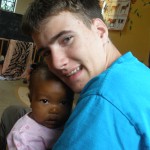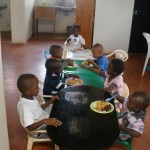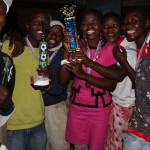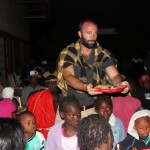This past week was a busy one, as I worked to complete a final report of my six months in Uganda.
Late last week, I went to Masindi for the last time to finish the work that the Pepperdine students, Pepperdine lawyers, and I started in an effort to help the twenty-two juveniles currently imprisoned at the Ihungu Remand Home awaiting their day in court. I brought with me two Ugandan lawyers who had participated in the J-FASTER session in Kampala that just ended. The two lawyers served as the mediators for the plea bargaining discussions between the prosecuting and defense attorneys that took place.
The goal was for me (and the two Pepperdine law interns that joined us – Samantha Placeres and Jacob Franz) to sit back and observe as we handed over responsibility for plea bargaining to the Ugandans who would remain here when we left. The key is sustainability. It was difficult for me not to jump in when things stalled a bit, and I ended up talking more than I intended to. In the end, however, we reached plea deals on almost all of the cases. Happily, the judge who will be hearing the cases is the same one with whom we worked in 2010, and he isn’t waiting around – the juvenile session begins next week, and he scheduled it for only one week, confident that the plea bargains will hold.
My good friends from Sixty Feet (including Abby Skeans, a Regent Law student with whom I have been working) will be attending the court session and helping in any way they can. I have given them all the forms and background they need to make sure it goes smoothly. I really wish I was here for one more week so I could be there to assist, but since the goal is to train them to do this on their own, God’s timing for my departure is better than my own.
One distinctly African delicacy I have wanted to taste for a while is what is fondly called “Road Meat.” At the junction where one branches off the main road to Masindi sits Uganda’s version of a truck stop. Rather than Pizza Hut, Subway, and Burger King, however, there are about 150 individual hawkers selling fried bananas, chapattis (essentially tortillas), water, warm sodas, and Road Meat. The Road Meat consists of chunks of meat (unclear what kind) that are skewered onto long wooden sticks and (allegedly) cooked on the wire grills over open fires alongside the road. My friend Jesse who heads the IJM office here in Kampala has been telling me for six months how good it is – best meat he has ever had. He has only gotten sick once, and it was worth it, or so he says. My friend Bob, however, has only had it once, and he got sick. Real sick. The way he described the immediate aftermath (and I mean immediate, and by math, I mean multiple exit points) I was pretty sure I didn’t want none of that.
But I was hungry. Real hungry. And I was leaving Uganda soon. Real soon. So when we reached the junction last Thursday, I told Michael to pull over – “Road meat for everyone – on me.” Each skewer is 1,000 shillings. The fact that a stick of meat was only 40 cents probably should have been a hint as to its quality. One tip Jesse had given me was to insist that the meat be put back on the fire for a few minutes before eating it, so I purposed to do so.
When we pulled over, the masses descended. There were at least thirty people shoving handfuls of sticks into our windows and begging us to buy from them. I got out, pushed through the crowd, walked over to one of the fires and declared that I wanted six sticks of meat put on this fire. The quickest one got the business.

Road Meat
Jesse was right – it was good. Real good. It was heavily seasoned, and kinda fatty, but delicious. My guess is that it was goat, but it could have been dog, for all I knew. On the way back that evening, I stopped again for more Road Meat. Happily, there was no leakage.
Speaking of exotic meats, my family and I ate four “crocodile wings” on Saturday. A few months ago, a former student of mine introduced my family to a young lady whose family owns and operates the only crocodile farm in Uganda (actually, in all of East Africa). We have been talking about going there since then, and finally did so this past weekend with one of the Pepperdine interns who is still here, Jenny Arnold.
Needless to say, I had never been to a crocodile farm before. They had about 60 stalls that were packed with crocs of roughly the same age and development. Our guide told us that having them the same age allowed for roughly equal competition for food at feeding times.
“Feeding times? Um, when are those?”
“On Mondays and Thursdays.”
“Shoot, we missed it. What do they eat?”
“Beef, fish, and chicken.”
“Are the chickens alive?”
“Of course.”
“Um, if I bought a chicken, could we feed one to them?”
“Sure.”
“Where can I get a chicken? Now.”
I immediately gave the guide money for the purchase of two live chickens. Within a few minutes, we had the chickens. I felt guilty sacrificing these chickens for the amusement of my family, but I am a really good dad and it was all about the children. I am quite a bit above the juvenile pleasures derived from watching animals eaten alive . . .
It was awesome! The guide chose a 30 by 80 foot pen with two huge crocs, aptly named Romeo and Juliet. When he threw the first chicken in, Romeo moved quickly.

Romeo Giving Chase
Henny Penny barely saw him coming. Romeo got a death grip on her and then took her under water.

Captured!
We weren’t sure if the strategy was to drown Henny, or just to help wash her down. The second chicken learned from his friend’s mistake and high tailed it into a corner. Juliet seemed a bit thick and didn’t seem to realize what was happening. She just chilled next to Romeo as he choked down Henny. After a few minutes, our guide got a bit impatient and jumped into the pen to grab the chicken.
This got Juliet’s attention and she hustled out of the water in the middle of the pen and started scampering toward our guide, whose back was turned as he was grabbing the chicken. Even I am not sick enough to enjoy that kind of sport, so I was rooting for Ugandan dude to get out in time. He grabbed the chicken and in one motion, whirled and threw it toward Juliet as she got within ten feet of him. The chicken glanced off of Juliet’s snout and skidded into the water behind her. Juliet was momentarily torn between the tasty morsel of a chicken, and the fully satisfying meal of the guide. Her hesitation cost her dearly. As dude scrambled out of the pen, Romeo pounced and treated himself to second breakfast. When the whole scene was over, I felt like I needed a cigarette or three. It was that satisfying. But it was all about the kids. At least as far as you know.
After that show, it seemed a bit anti-climactic to hold a croc, but it was still cool.

Holding the Baby Croc

Even Jennifer Held the Croc
Our friend whose family owns the croc farm arranged for them to cook us four crocodile “wings.” They don’t actual serve croc meat there, so it was a real treat. Guess what they tasted like? I guess it is true that you are what you eat. We all had some, but my youngest daughter Jennifer when to town, eating more than any of us.
From the croc farm, we drove a bit farther south to the Equator. It reminded me of a road stop in New Mexico or Arizona where the Native Americans sell their wares in makeshift stalls by the highway. There were lots of African trinkets, but there was also a line on the road that ran all the way into a shop. That was the Equator itself. Not an estimate of where they Equator might be, but the exact place where it was. And the owner of the shop proved it. There were three bowls, each with a hole in the bottom set up. One on the Equator and one each five meters on either side. For a mere ten thousand shillings (four bucks), the shop owner poured a bucket of water into each bowl, one at a time, to demonstrate that, indeed, on one side of the Equator, the water drained clockwise, on the other side counterclockwise, and on the Equator, straight down. It was really cool, but I didn’t need a cigarette afterward.

Equatorial Fun

A Fitting End to a Wonderul Adventure




![581025_393295634059125_146275298_n[1]](http://www.throwingstarfish.com/wp-content/uploads/2012/08/581025_393295634059125_146275298_n1-600x401.jpg)
![581025_393295624059126_1861503668_n[1]](http://www.throwingstarfish.com/wp-content/uploads/2012/08/581025_393295624059126_1861503668_n1-600x401.jpg)
















